-
14 biomarkers measured
-
CLIA-certified and CAP-accredited lab
-
Finger prick sample
-
Fasting
-
Virtual Care available
What is measured?
This test measures the following biomarker:
-
Estradiol
Estradiol is the primary form of estrogen produced by the ovaries. It is essential for reproductive health and pregnancy as it is one of the primary sex hormones responsible for ovulation. Estradiol levels drastically decrease after menopause. In addition to helping the brain and reproductive system function at their best, estradiol also affects bone formation, the development of secondary female sex traits, fat distribution, libido, and cardiovascular health.
-
LH
LH levels help women to determine when they ovulate, why they might have trouble getting pregnant, and to help to identify the cause for irregular or no periods, and to diagnose PCOS, and confirm and track menopause or perimenopause. LH levels are also used to measure health of the pituitary gland, to find pituitary tumors, and to enable evaluation of early or late puberty in children.
-
FSH
Follicle-Stimulating Hormone (FSH) is produced by the pituitary gland and plays a crucial role in regulating reproductive processes, such as egg development in the ovaries and sperm production in the testes. FSH is used to evaluate fertility issues, diagnose pituitary gland disorders, and diseases involving the ovaries or testes. It helps determine the cause of irregular or absent menstrual periods in women, assess menopause onset, and investigate delayed or early puberty in children.
-
LH/FSH ratio
The LH/FSH ratio measures the relative levels of luteinizing hormone (LH) to the follicle-stimulating hormone (FSH) in the body. LH and FSH hormones are both secreted by the pituitary gland and play important roles in regulating the reproductive system. The LH/FSH ratio is typically used in the evaluation of certain reproductive disorders, such as polycystic ovary syndrome (PCOS).
-
TSH
Thyroid-Stimulating Hormone (TSH) is a hormone produced by the pituitary gland that regulates the function of the thyroid. TSH controls the production of the thyroid hormones thyroxine (T4) and triiodothyronine (T3), which are essential for maintaining metabolism, energy levels, and overall hormonal balance. TSH is one test that is used to diagnose thyroid disorders such as hypothyroidism (underactive thyroid) or hyperthyroidism (overactive thyroid), Graves' disease, and Hashimoto's thyroiditis, and to monitor the effectiveness of thyroid treatment.
-
Anti-mullerian hormone
Anti-Müllerian hormone (AMH) is a hormone produced by the ovaries in females. It plays a crucial role in early development, but in adult women, it is a marker of ovarian reserve, reflecting the number of eggs remaining in the ovaries. AMH levels can be measured through a blood test and used to assess fertility potential, predict menopause onset, and diagnose certain ovarian conditions.
-
Prolactin
Prolactin is a hormone produced by the pituitary gland. It is crucial for milk production in women and increases during pregnancy and breastfeeding. It affects the menstrual cycle, fertility, and immune system. Abnormal levels can lead to infertility or irregular cycles (high levels) and breastfeeding issues (low levels).
-
Insulin
Insulin is important for using and storing glucose, which is a type of sugar that comes from the food we eat and is the body's main energy source. After eating, food is digested and glucose enters into the bloodstream. Insulin helps move glucose out of the bloodstream into the body's cells, especially muscle cells, to make energy. It also tells the liver to change extra glucose into fat and carbohydrates.
-
Total testosterone (female)
Total testosterone is a sex hormone present in females in small amounts. It helps with the growth, development, and function of bone density. It also helps develop muscle strength, libido, and fat distribution. The total testosterone test measures the combination of both free and protein-bound testosterone.
-
Progesterone
Progesterone levels are used to help confirm ovulation, abnormal uterine bleeding, or menstrual problems. It is used to monitor early pregnancy. It can also help look into fertility issues including diagnosing luteal phase deficiency.
-
Free testosterone
Measuring free testosterone in females is important as it can relate to mood, energy levels, muscle mass, and libido. Abnormal levels might indicate conditions like polycystic ovary syndrome (PCOS) or adrenal gland disorders. Monitoring free testosterone helps in diagnosing and managing these health issues effectively.
-
SHBG
SHBG is a protein made mostly by the liver. It attaches to sex hormones in the blood, like estrogen and testosterone, and helps control how much of these hormones are active in the body. High SHBG levels can lower free testosterone, which might show conditions like PCOS. Abnormal SHBG levels can also indicate hormone problems like hyperthyroidism or low sex hormones. SHBG levels can also reflect liver health, with changes suggesting liver disease or problems.
-
Albumin
Albumin is a protein produced by the liver that helps diagnose liver and kidney disorders. Albumin is an antioxidant and detoxifying protein that prevents fluid loss and transports nutrients and hormones throughout the body.
-
DHEAS
The DHEAS hormone, primarily produced by the adrenal glands and also by the ovaries, helps create female sex hormones. It's crucial for body changes during puberty. This test checks adrenal gland function, identifies adrenal problems, and addresses hormone issues like excess hair, infertility, polycystic ovarian syndrome (PCOS), and early or late puberty. It helps your provider understand adrenal health and treat hormone-related issues.
Who should take this test?
This test is suitable for women of childbearing age who are interested in understanding their fertility health. It is particularly beneficial for women who:
- Seek a proactive approach to managing their reproductive health
- Have a history of infertility or are trying to conceive and want to determine most fertile days
- Have irregular menstrual cycles or concerns about ovulation or hormonal imbalances
- Are experiencing symptoms that may indicate underlying fertility issues
- Are planning to pursue IVF or pursue fertility preservation
- For women age 18+
How to test?
Before you begin:
- Take the Day 3 test on the third day of your cycle, and the Day 21 test on the twenty-first day of your cycle.
- When you wake up, drink 12oz. of water and collect your blood sample 1 hour later.
- Avoid smoking for 1 full hour before collecting your blood sample.
- Wash your hands with soap in warm water, and then rub them together.
- Do some light exercise, like jumping jacks, to increase blood circulation.
Register your test ID online and collect your sample:
Scan the QR code inside your kit and follow the instructions to collect your sample.
After collection:
- Let your sample dry completely on card (2 hours).
- Mail test box the same day using the prepaid label. If you take your test on Sunday, mail it in first thing on Monday.
Pre-Testing Video
Pre-Testing Video
What is in the box?
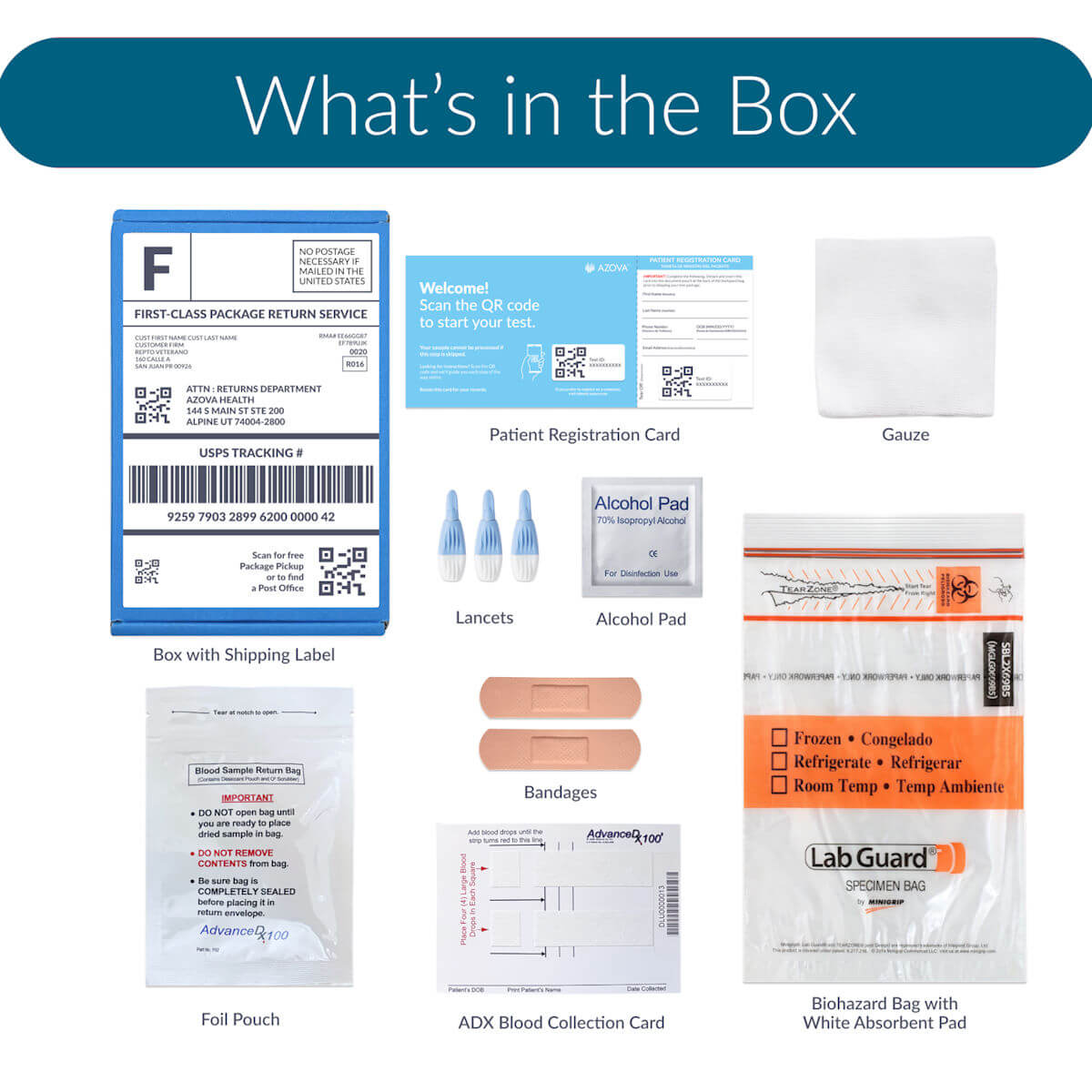
What to expect?
- Prepaid shipping label and packaging for an easy return to the lab
- All the necessary materials for sample collection
- Live 24/7/365 proctoring to guide you through the sample collection process
- Easy-to-follow video directions to help you along the way
- Digital (and printable) results found in the AZOVA app
The HEALTHBOX™
2-Phase Fertility Test Bundle
2-Phase Fertility Test Bundle
2-5 days
Couldn't load pickup availability
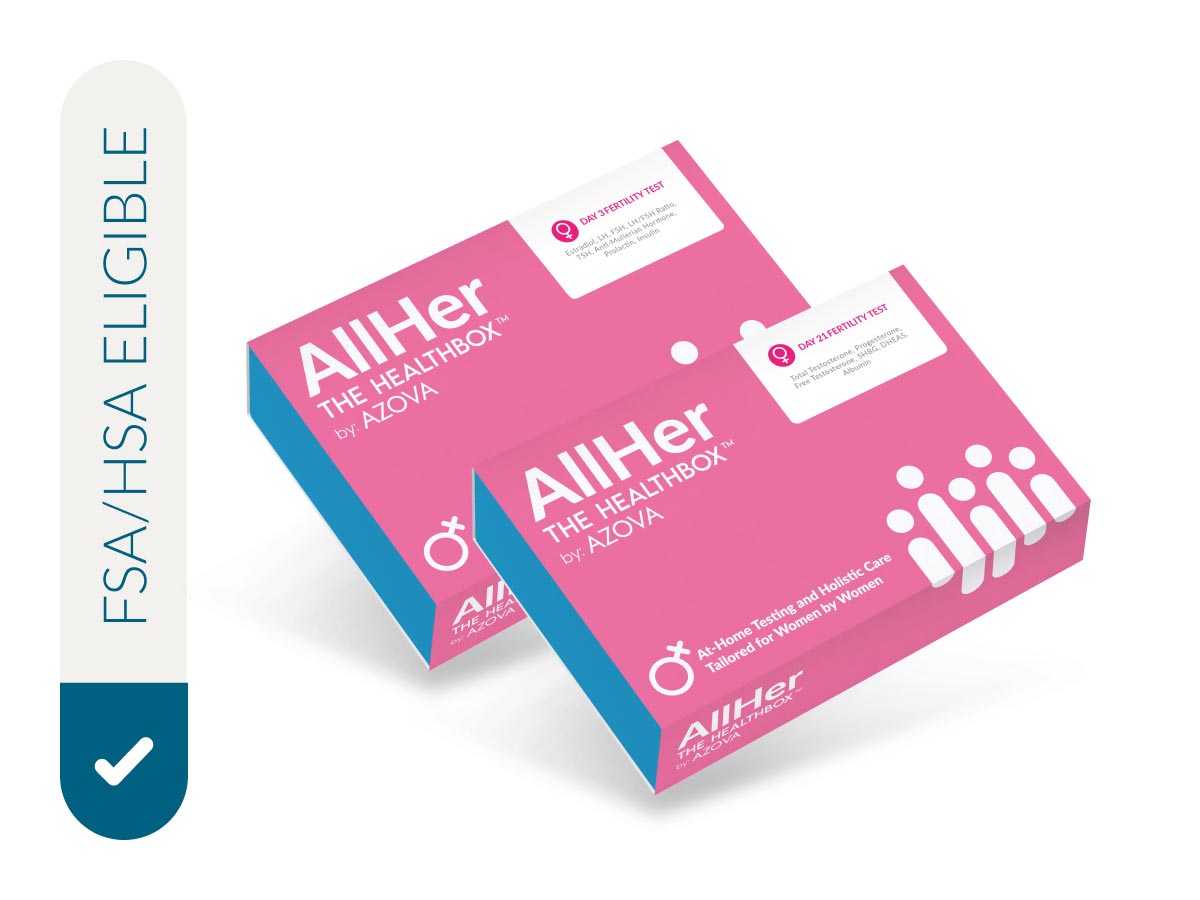
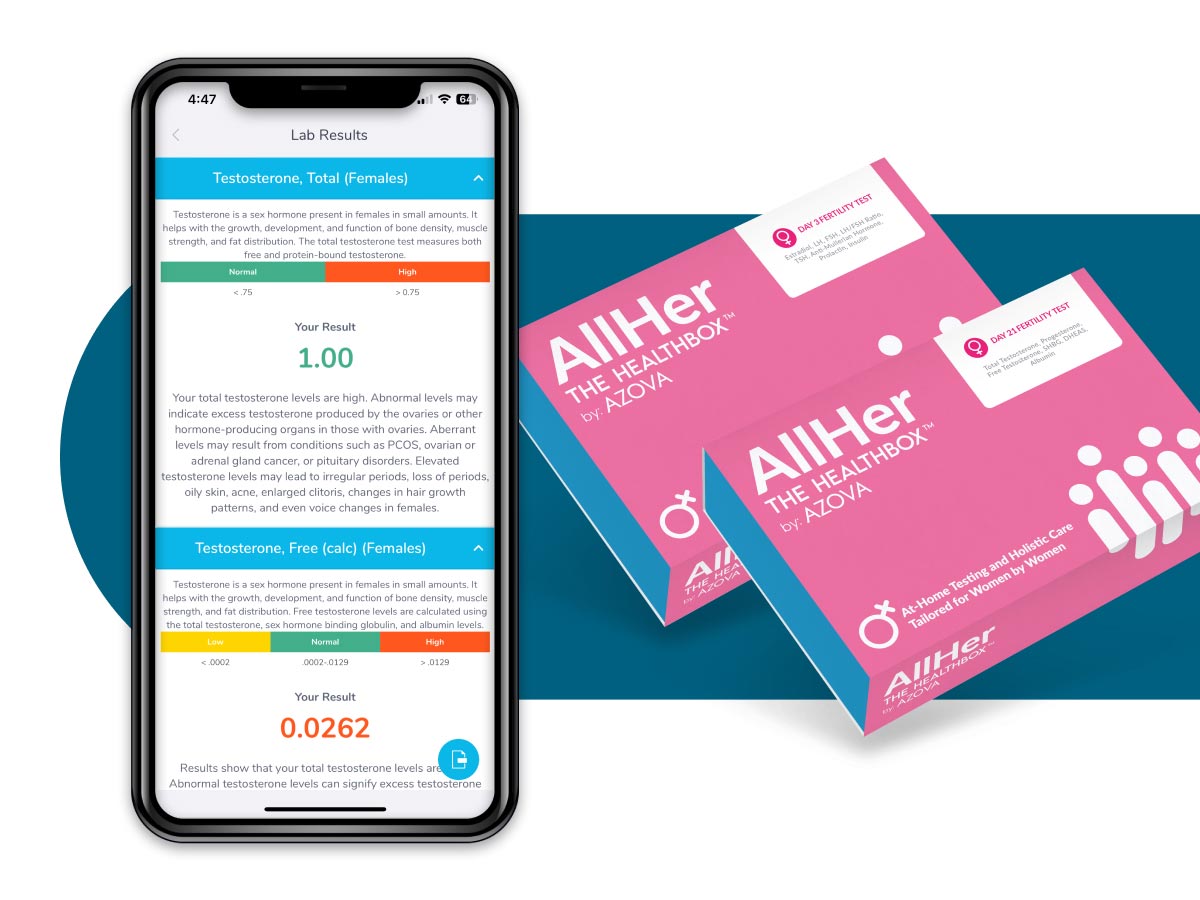
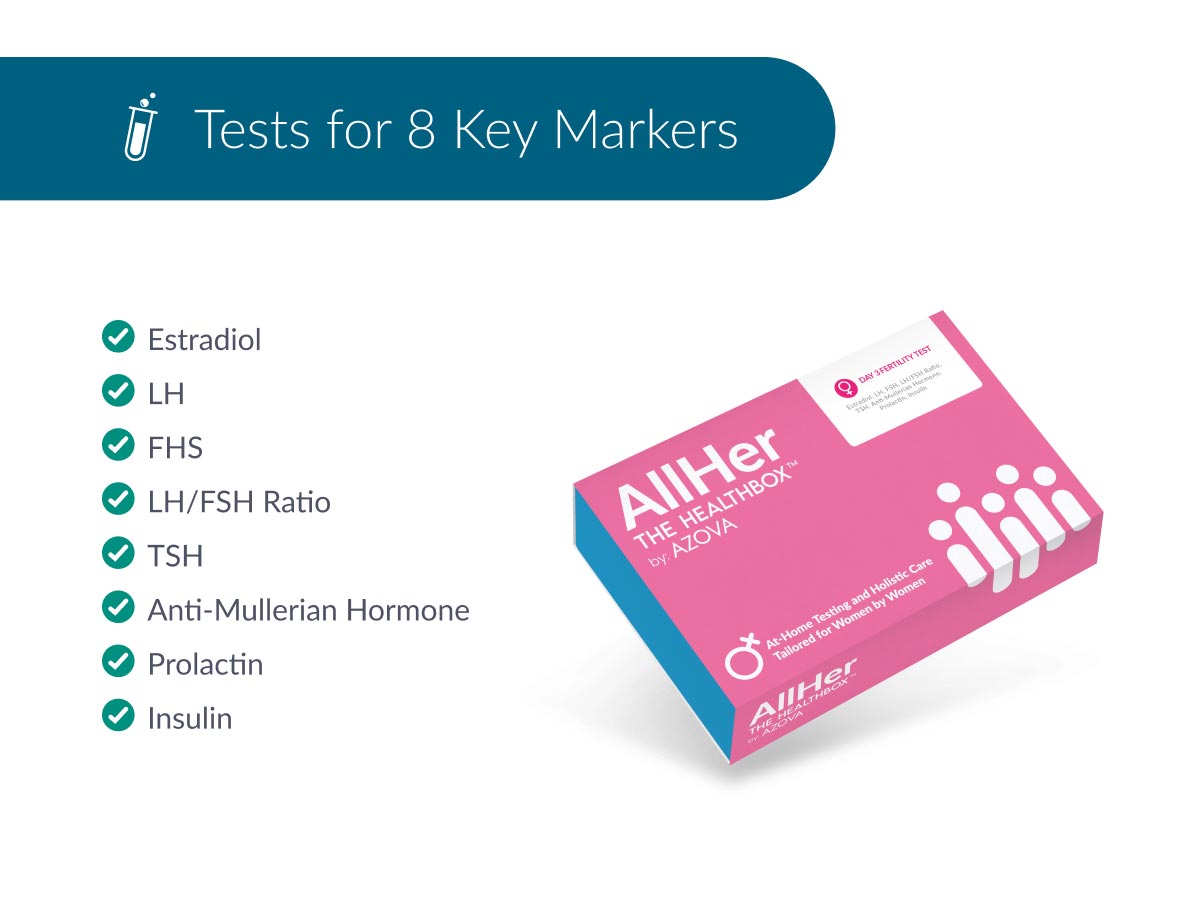
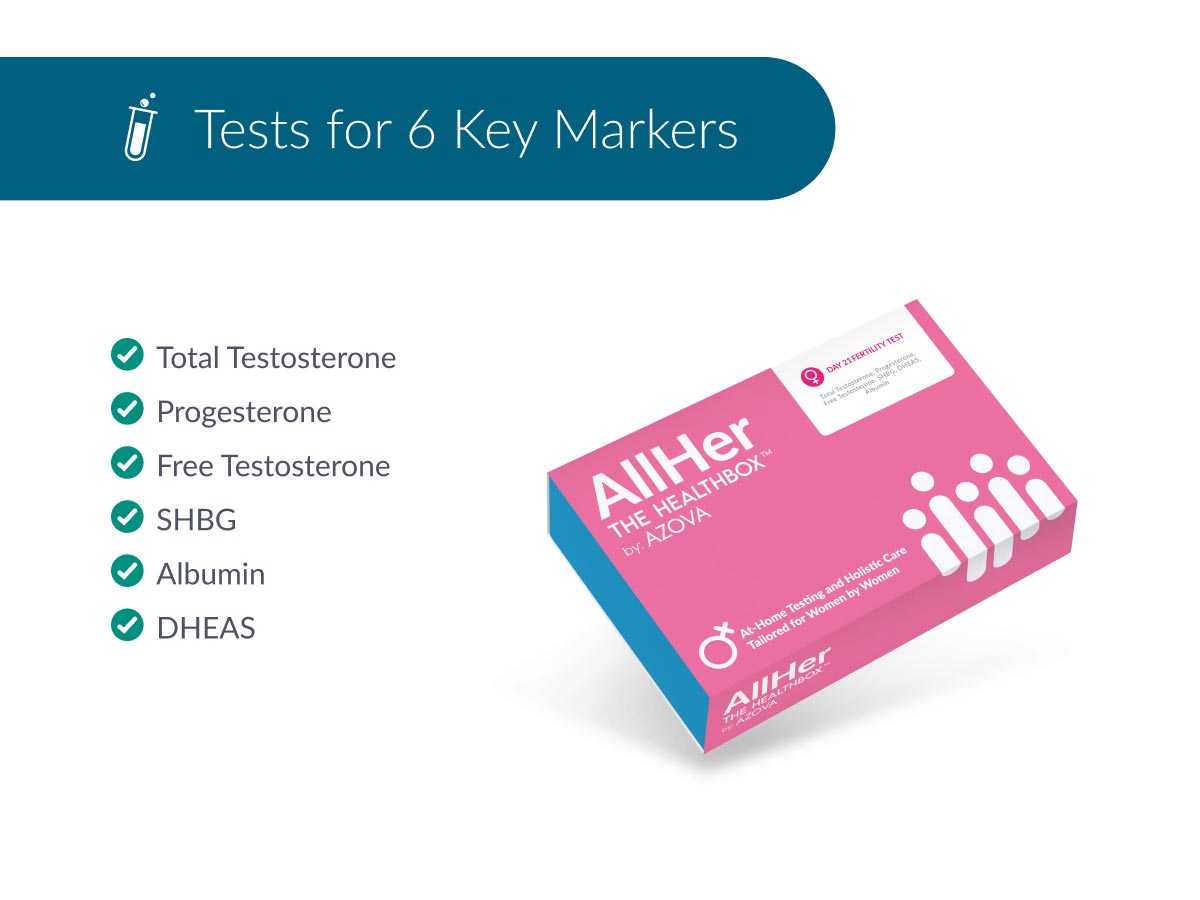
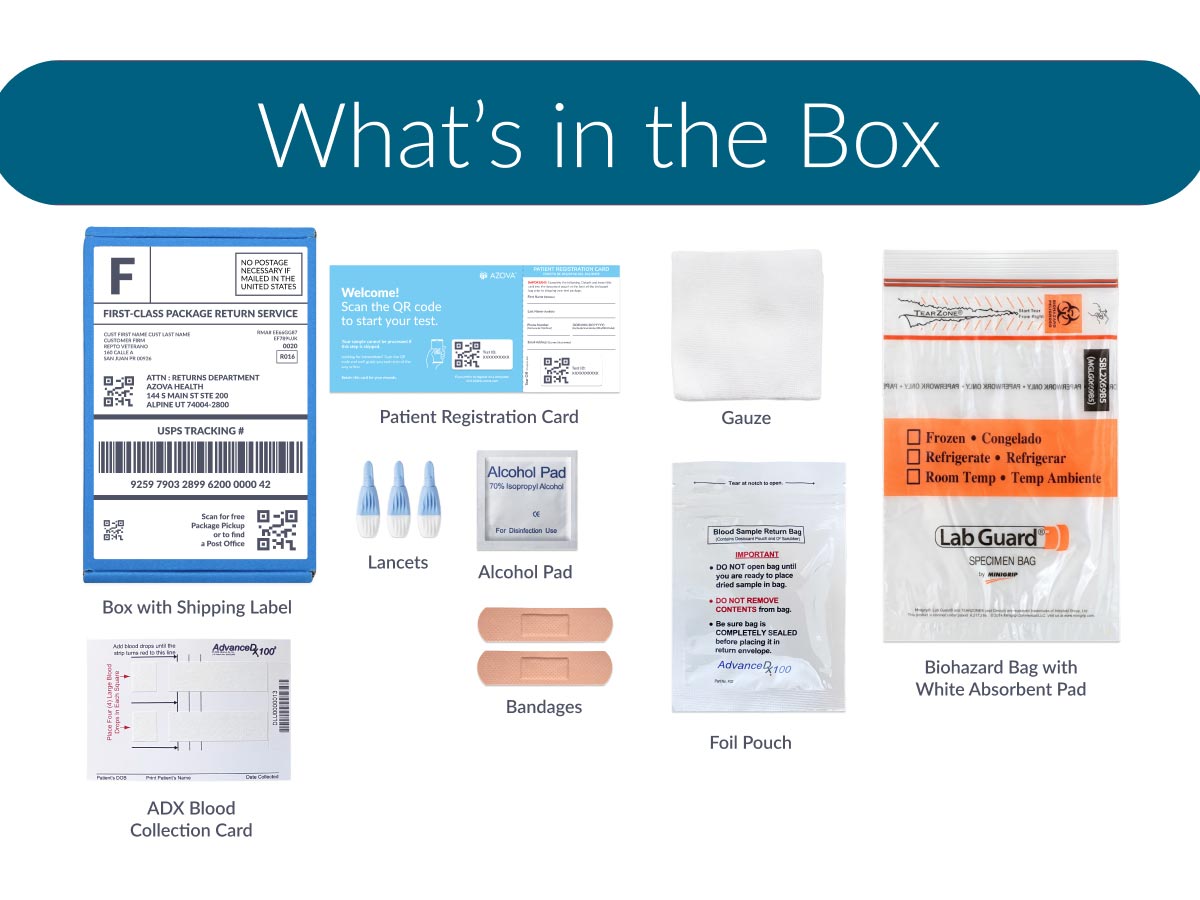
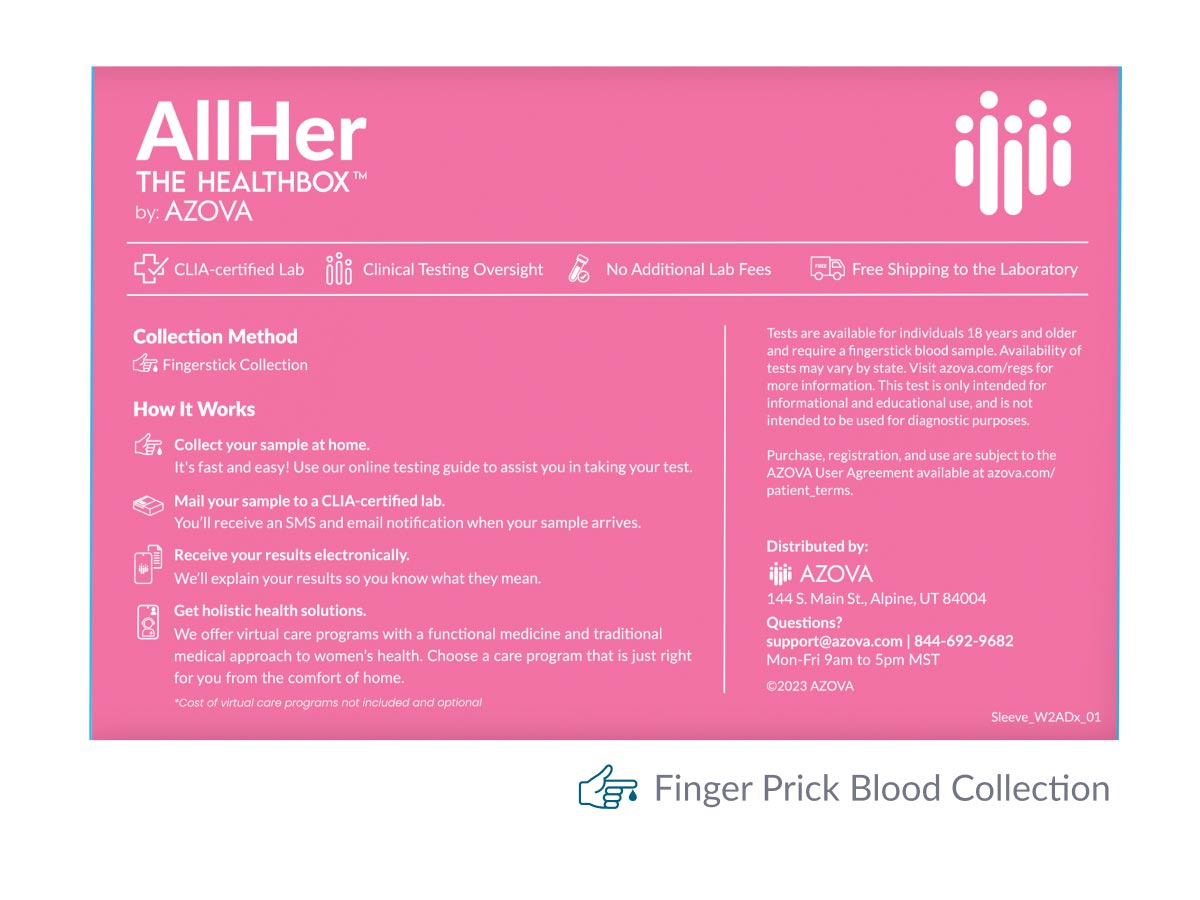
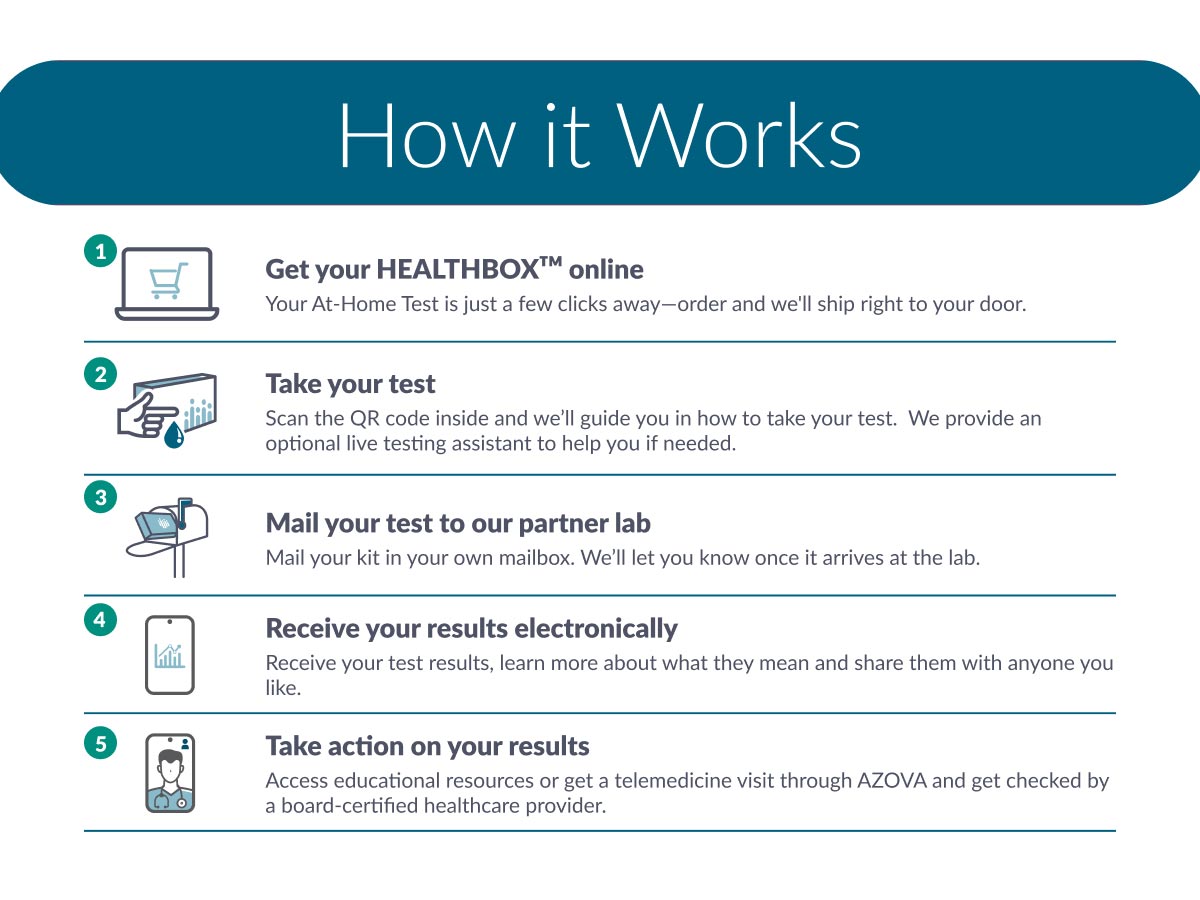
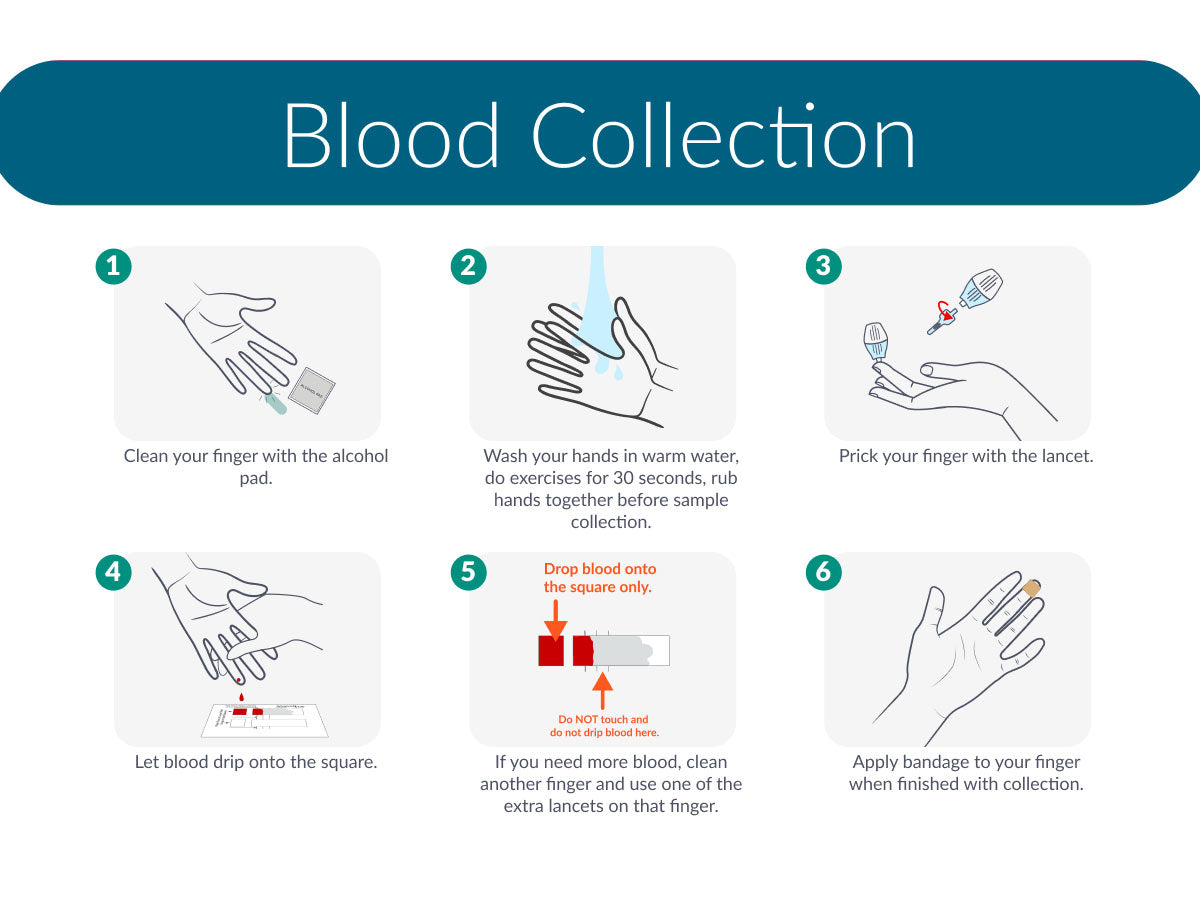
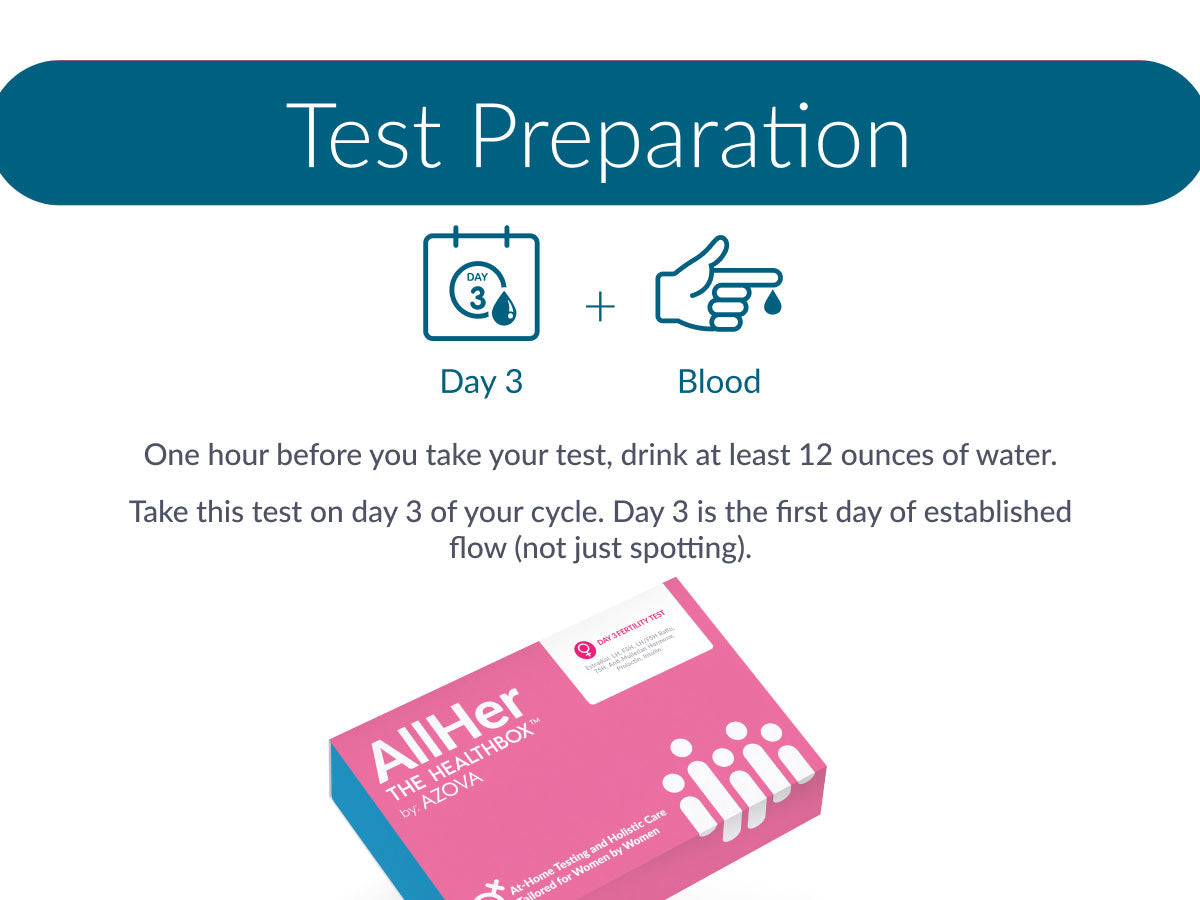
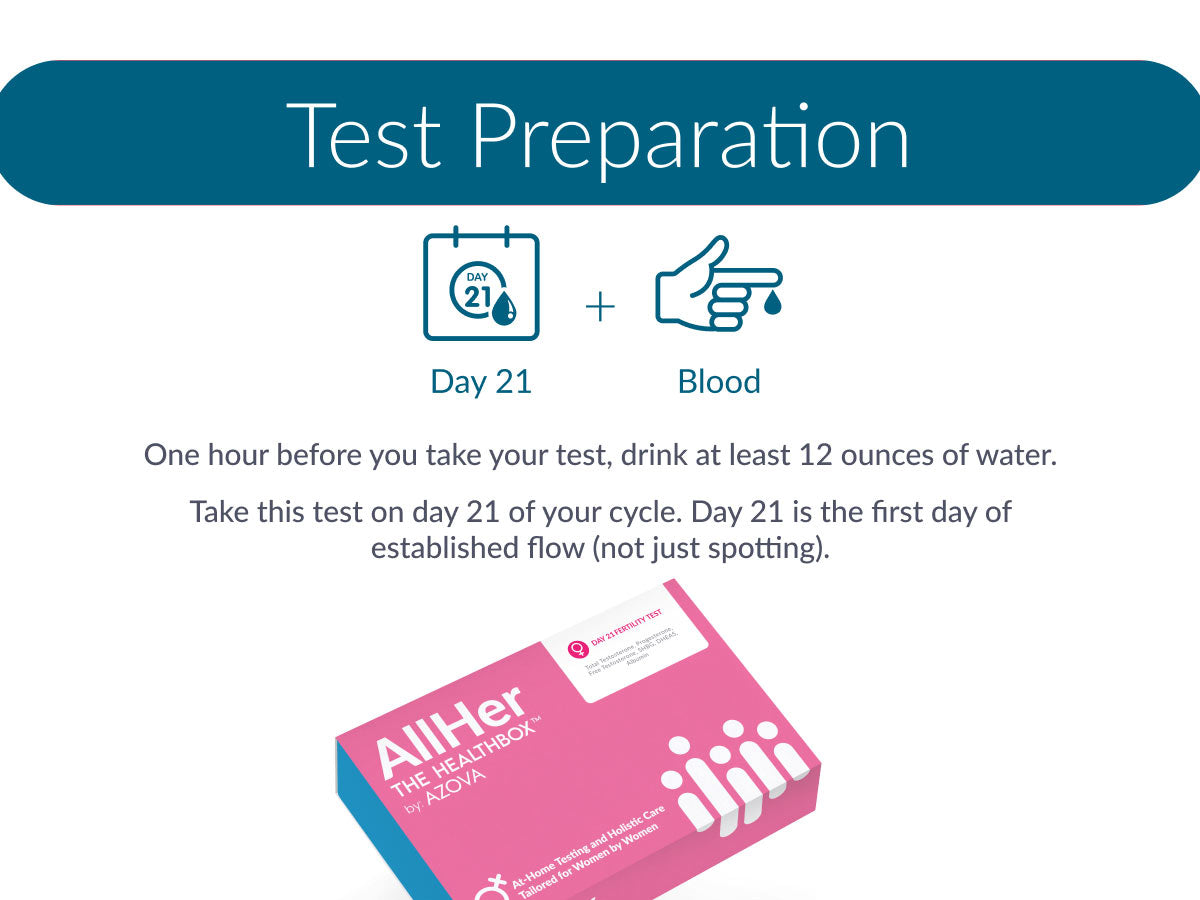
How it works
-
1
Collect your blood sample at home.
Fast and easy sample collection either with our online testing guide or virtual proctoring service.
-
2
Mail your sample to a CLIA-certified and CAP accredited lab.
You’ll receive an SMS and email notification when your sample arrives.
-
3
Receive your results electronically.
Complete with a digital report that is printable in the AZOVA app.
-
4
Take action on your results.
Access our educational materials or get a virtual care visit with a certified health provider (cost not included).
Frequently asked questions
Are AZOVA tests covered by FSA/HSA?
- Use your AZOVA test order confirmation to submit for FSA/HSA reimbursement.
- As defined by the IRS, many FSA/HSA benefits coordinators consider AZOVA tests to be qualified medical expenses.
- However, some FSA/HSA benefits coordinators might deny reimbursement. Before purchasing, please consider checking with your benefits coordinator to see if your FSA/HSA covers AZOVA products.
Who should take this test?
Women trying to conceive (age 18+):
Those trying to conceive, with irregular cycles, or concerned about ovulation/hormones
Proactive fertility management:
Women seeking a head start on understanding their reproductive health
Investigating fertility concerns :
With a history of infertility, experiencing potential fertility issues, or considering IVF/preservation
What if I have questions about this test or my results?
For questions about your test or results, contact AZOVA Customer Support at 844-692-9682, available 24/7.
For a more in-depth discussion of your results with a healthcare provider, AZOVA's Virtual Care is available at azova.com for an additional cost.
In which states can I purchase this test?
Tests are available for individuals 18 years and older and require a blood sample. Availability of tests may vary by state. Visit azova.com/states for more information. This test is only intended for informational and educational use, and is not intended to be used for diagnostic purposes.
Purchase, registration, and use are subject to the AZOVA User Agreement available at azova.com/patient-terms.
Information presented here is not intended to diagnose or treat any condition and is provided for educational purposes only. Always consult with your healthcare provider before making any healthcare decisions.
If you are having a life threatening emergency, please call 911 immediately.

Virtual care 24/7
Save time and money when you see a doctor online.
Get started for $59.


Talk with Customer Support
You can call AZOVA’s Customer Support team for comprehensive support, including help with your account, testing, results and telemedicine visits.
Please note that wait times may vary depending on call volume.
(844) 692–9682










